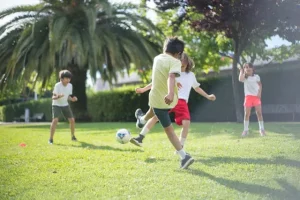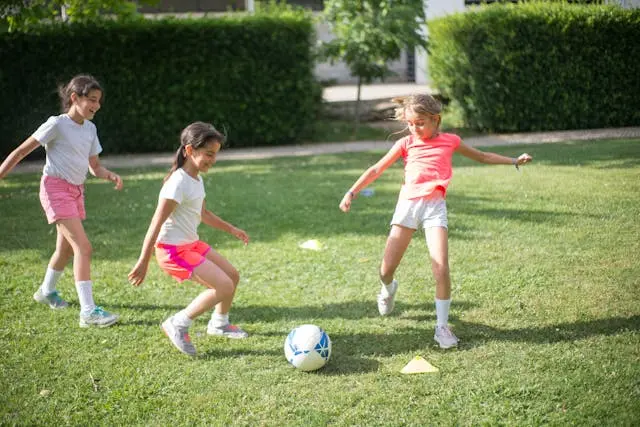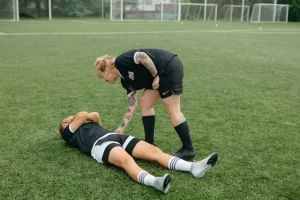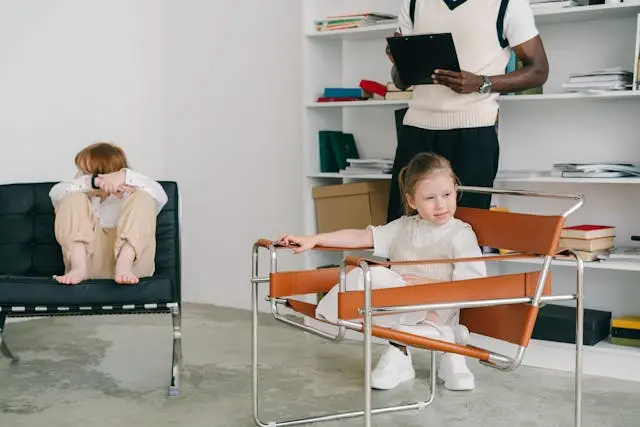Pros and Cons of Organized Sports for Kids- Should You Enroll Your Child?
The article is developed in partnership with BetterHelp.
If you’re a parent who’s searching for the right balance of freedom and guidance, you may have found yourself considering whether signing your children up for sports is the right decision.
Before you sign them up for the local soccer league, it’s a good idea to consider both the pros and cons of youth sports.
The potential benefits of organized sports

There are many benefits kids can get from joining a sports team, including the following:
- An opportunity to face their fears
Organized sports can provide children with an opportunity to manage performance nerves and make decisions under pressure.
Note that some kids develop performance anxiety that impacts their game or overall mental health. It may be a good idea to read up on sports psychology here: https://www.betterhelp.com/advice/psychologists/can-a-sports-psychologist-help-me-improve-my-game/. In these instances, it’s likely that parents and/or coaches are putting undue performance pressure on children.
- Work as a team
Team sports can develop skills like leadership, how to take and provide constructive feedback, communication, cooperation, and conflict resolution.
- Develop new friendships
Sports provide many opportunities for making friends from different schools and communities. Many kids find that working hard to accomplish goals together and bonding through practices or road-trips for competitions provides deep and enriching friendships.
To give children time outside of sports to bond, consider carpooling to practices and games, or inviting your kids’ teammates and parents out to eat after games.
- See hard work pay off
Getting better at sports requires discipline and practice. By watching their hard work make a difference, children can build a stronger work ethic.
- Honing executive function
By enrolling in a sport, children can hone their executive function skills by developing long-term goals, persevering through challenges, decision-making, and motivating themselves to work hard.
- Stay accountable
Organized sports require persistence, dedication, and humility. Children can learn how to stick with their commitment to go to sports practice and accept responsibility for their mistakes when they inevitably occur.
- Stay physically active
It’s recommended that children ages 6-17 need at least 60 minutes of physical activity each day. While this can be achieved with many forms of activity, like going for a hike, riding a bike, or playing on the playground, organized sports can provide a great opportunity to get moving and learn the basics of strength training. Learning these skills in childhood could help people stay physically active long after they’ve stopped playing organized sports.
- Improve mental health
One study examined the effects of team sports, individual sports, and non-sports participation on youth mental health. The authors found that, in comparison with non-sport-participation, participation in team sports was associated with 10% lower anxiety scores, 19% lower withdrawn scores, and 12% lower attention problems scores.
However, this association did not hold with individual sports. Compared with non-sport-participation, individual sports participation was associated with 16% higher anxiety scores, 14% higher withdrawn scores, and 14% higher attention problems scores.
- Learn to see failure as an opportunity
No matter how good a child is at sports, they will lose a game or get a disappointing outcome. Organized sports can teach children the skills of humility, resilience, perseverance, and problem solving. Instead of seeing a loss as a sign that they’re bad at a sport or that they need to quit, children can learn to view a loss as an opportunity to identify areas for improvement and work on them.
When organized sports can be harmful
Despite all the benefits that youth sports can have, it’s important to be aware of the potential downsides:
- It’s a significant time commitment
Organized sports can take up a significant amount of time for children and their families, which may make it difficult to balance with other commitments, such as time with friends, schoolwork, and family time.
While time-management skills are important for kids to develop, the commitment of sports can easily become overwhelming. And, as children progress in sports, they often require a larger time commitment. For example, a 12-year-old junior Olympic gymnast may spend 20+ hours in the gym each week.
- Focusing on physical size
Some competitive sports can focus heavily on weight or physique, which can contribute to the development of obsessive exercise habits or eating disorders.
- Unhealthy competition and pressure
In some instances, parents and coaches put excessive pressure on children to win, get scholarships, or build a career out of athletics. As Travis Dorsch, director of Utah State University’s Families in Sport Lab, said, “I don’t know that we’re doing a great job of catering to young people in sports. It’s become a very adult-driven, competition-focused context.”
The focus on measurable successes, like trophies or win-lose stats, can take sports from a place of healthy competition to hyper-competition, which becomes mentally and physically exhausting for children. Commonly, this leads to things like anxiety, burnout, resentment, injury, and eventually quitting.
- Internalizing losses
When the primary goal of parents, coaches, and children is winning, it’s common for children to internalize a poor performance as an indicator that they’re a failure.
If your child plays sports, be careful to praise and emphasize the process, not the outcome. For example, instead of saying “You clobbered that other team” when your child wins, say something like, “Wow, it’s really cool how you passed the ball to your teammate so they could score. It’s clear you’ve been working hard to be a thoughtful team member.”
- Injuries
All sports carry some risk of injury. For example, head injuries are common in football, shoulder and elbow injuries are common in tennis and baseball, and knee injuries are a common occurrence in competitive soccer.
There are some steps families can take to reduce the risk of injury—like investing in the proper gear and ensuring coaches prioritize safety—but families will need to decide if the risk of an injury is worth it.
- Harmful coaches
A great coach should provide children with constructive feedback and encouragement that helps them become confident, courageous, resilient athletes. However, not all coaches operate with the mental health of their team in mind.
Some coaches criticize or belittle youth athletes by doing things like calling them names, mocking, shouting, intimidating, isolating, or threatening them.
This type of bullying is considered emotional abuse, and it’s relatively common in sports. Toxic coaching can lead to the child blaming themselves, experiencing low self-esteem, or otherwise harm their mental health and ability to enjoy the sport.
- Inflated sense of self
Society tends to view winning athletes favorably, and constant praise from family, coaches, school, peers, and the community can lead to an inflated ego, reduced humility, and less empathy for their teammates or others.
- The harm of sports for parents
Organized sports can be hard on parents. In addition to the financial burden of buying equipment and paying for leagues, parents may expect significant time commitments to shuttle their child to practices, matches, and other events.
The financial, time, and emotional commitment required of parents can increase the pressure on kids, too.
Making the best decision for your child
Organized sports can certainly be a healthy physical outlet for children, but that doesn’t mean it always is. When you’re weighing whether to enroll your child in sports, consider the following:
- Their personality:
Different personalities are often drawn to different sports. For example, someone who’s typically calm or introverted may prefer a sport like tennis, whereas someone who’s more competitive or outspoken may prefer a contact sport like soccer.
- Your intentions:
Consider whether your own intentions have a role in wanting your child to sign up for a sport. For example, if you competed in lacrosse as a child, are you pressuring your child to follow in your footsteps? Do you want your child to have a healthy outlet to learn new skills and make new friends, or do you want them to give you bragging points and get a full-ride college scholarship?
- What kinds of sports might be a good match:
Would a team sport or individual sport be a good fit? What sports are appropriate for your finances and time? What sports have good safety records?
- Available coaches and teams:
Ideally, you should look for a coach who prioritizes things like safety, teamwork, and having fun. Explore what kinds of leagues are in your area and consider attending a practice session or two to observe how the coach interacts with athletes.
Takeaway
Organized sports can be a great opportunity for children to learn new skills, build self-confidence, and have fun. When children experience undue pressure or playing sports is no longer fun, it’s a good sign that it’s time to reevaluate.








